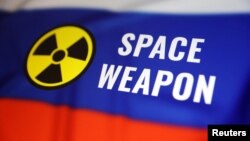With geopolitical tensions escalating, the risk of nuclear warfare is at its highest point in decades, according to the United Nations. Today, new wars have promoted a sense of unease, and nuclear weapons are back in the public consciousness.
The United States is committed to strengthening and upholding the nuclear non-proliferation and disarmament regime, with the Non-Proliferation Treaty at its center, said U.S. Permanent Representatives at the UN, Linda Thomas-Greenfield.
“And yet, the global framework that has curbed nuclear armament for years is under increasing strain,” she said. “Iran has continued expanding segments of its nuclear program without any credible civilian justification, and for over five years, has failed to cooperate with the IAEA.
“Since launching its full-scale invasion of Ukraine, Russia has irresponsibly invoked dangerous nuclear rhetoric, and walked away from several of its arms control obligations,” said Ambassador Thomas-Greenfield.
“All the while, China has rapidly and opaquely built up and diversified its nuclear weapons stores. And Russia and China have remained unwilling to engage in substantive discussions around arms control or risk reduction.”
"What’s more, both countries have defended and even enabled dangerous proliferators,” she said.
And then there is the DPRK, or North Korea, “which continues its unlawful development of weapons of mass destruction and ballistic missiles,” said Ambassador Thomas-Greenfield.
But “It is not just these individual actors putting a strain on the global nonproliferation regime.”
“Today, our existing regime faces new and evolving challenges: Like artificial intelligence, which can be hacked or malfunction, be misinterpreted or provide misinformation.”
“We can take stock of the challenges posed by these new technologies, and more importantly, commit to addressing them,” said Ambassador Thomas-Greenfield.
“And then there is the issue of outer space, and the treaty governing it.”
“Together with Japan, the United States put forward a Security Council resolution, reaffirming the fundamental obligations that parties have under this Treaty, and further calling on Member States to not develop any nuclear weapons, or other kinds of weapons of mass destruction, that are specifically designed to be placed in orbit around earth,” she said.
“The United States has already begun considering approaches to help ensure that countries cannot deploy nuclear weapons in orbit undetected, and we intend to engage with other States Parties as our ideas evolve,” said Ambassador Thomas-Greenfield. “Let me be clear: Any placement of nuclear weapons into orbit around the earth would be unprecedented, dangerous, and unacceptable.”






